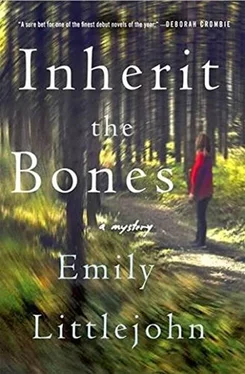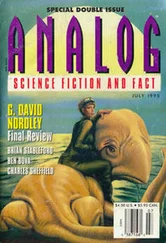Instead, she seemed small and sad and lonely. She played with the pendant on the chain, a gold coin that flashed in the sunlight as she twisted it with her right hand.
I was starting to think maybe she had multiple personalities, and then I remembered being in my early twenties, and the angst, and the awful feeling of not knowing your place in the world, and I decided she was probably absolutely normal.
She’d also just attended her boyfriend’s funeral. There was no acknowledgment of Tessa from the reverend or the Bellingtons, and I wondered if they even knew Nicky had spent the last few months of his life with a pretty and talented young woman who loved him.
“That’s lovely, your necklace,” I offered.
She lifted it and looked at it, then let it drop back to her chest.
“I suppose. My parents gave it to me on my sixteenth birthday. They gave it to me, and I gave them court documents to sign to emancipate me.”
“Was it really that bad?”
She shrugged. “What’s bad? We had food to eat, and clothes on our back, and no one hit me. They put every spare nickel they could into my gym training, and then my bar training. I was their princess. But I knew I was only going to go so far on their dime, in little old Keylock, Idaho.
“Once they signed off on the papers, I couldn’t get out of that trailer fast enough. Without their financial support, I was free to get all sorts of training fees waived, and scholarships, too. And then Papa Joe came along, and well, you know the rest,” she continued. “Now I do everything I can to make sure I’ll never live in poverty again. Hence, all the classes I’m taking, the finance and accounting stuff. I feel like if I can understand how money works, how it really works in the real world, I’ll be that much more ahead of the game.”
I nodded and looked back at the gravesite.
I saw Terence and Ellen Bellington take up places next to the raised coffin. They stood on either side of Annika; all three dressed in black. In front of them, Frank Bellington sat in his wheelchair. Across from the Bellingtons, Darren Chase took a place next to Paul Winters, the founder of the Forward Foundation, the group that had been camping together when Nicky had gone over Bride’s Veil.
The men hugged, and then Darren patted Paul on the back.
I hadn’t realized they were friends.
Whenever I saw Paul Winters I thought of that actor, the one that played George Costanza on Seinfeld, whose real name I could never recall. Paul was short, rotund, and wore wire-rimmed glasses. He was balding on the top of his head-round as a cue ball and rapidly getting sunburnt-but wore the rest of his dark hair in a tidy ponytail that reached his collar.
I watched as Paul leaned toward Darren and spoke into his ear. Darren murmured something in response and then clapped Paul on the back again. The older man had eschewed a suit; instead, he wore dark slacks and a gray short-sleeved dress shirt with a red bolo tie. When he lifted his hand to push his slipping glasses back up the bridge of his nose, his massive watch caught the sunlight and reflected it like a solar panel. The thing was the size of a cell phone and I’d have bet serious money it was fully loaded with every accoutrement you could hope to get into a watch.
I didn’t know much about Paul.
He made a bucket of cash in the dot-com boom and was lucky enough to pull out before Silicon Valley went bust. He tooled around South America for a few years, starting up but never completing schools for orphans, and somehow found his way to Cedar Valley. He’d been here less than a year before opening the Forward Foundation.
Tessa interrupted my thoughts. “Gemma, what do you hope for, most of all, in the whole world?”
She’d resumed playing with her pendant, and her fingers slid the pendant up and down the gold chain, back and forth. I started to answer and then stopped, really considering her question.
What did I hope for, most of all, in the whole world?
“Well, I think hope is a funny thing. It’s not quite want, is it? And it’s not quite desire, either. I guess what I wish for, really, is probably the same as most people. I want my life to count for something good.”
Tessa watched the crowd at the gravesite. “I get terrible insomnia sometimes. I lie in bed and all these thoughts spin around in my head, so fast, and I can’t sleep. I lie there and think and think and think. I just want to be somewhere I can stop thinking. Stop worrying about my routine, my future, having to move back to Keylock, living with my parents in their two-bedroom trailer, failing.”
How do you tell a twenty-two-year-old that the worries only get worse?
You don’t, unless you are the cruelest kind of person.
“Tessa, you seem to have a good head on your shoulders. I think you’ll do fine,” I said. “But, there’s something I want to ask you, and I have a feeling you’re not going to like it. But I’d like the truth, here, right now, just the two of us, woman to woman, okay?”
She looked up at me.
“I heard that Lisey moved out of the cabin. What’s going on with you two? I hear one thing from you, and something else from her,” I said.
I paused and then added, “To be honest, I’m not quite sure who to believe.”
Tessa’s face flushed and she stood up. “What did she say about me? Did she tell you I was a liar? That I’m psycho? She is such a bitch.”
I stood, too, and sighed, and stretched to the side. I couldn’t find a comfortable position anymore. Sitting, standing, walking, laying down, it all hurt these days.
“I’m just asking what happened. Did you two have a fight? When girls fight, especially girls as close as you two, sometimes nasty things get said.”
A winch started up at the gravesite and I glanced over as the coffin was slowly lowered into the ground. The crowd began to disperse, but the Bellingtons, and Darren and Paul, and a few others remained.
“We did have a fight, a really bad one. There’s this girl, Stacey, that Lisey… likes. Not like she loved me, but she just likes her and I don’t know why, I think she’s messed up and fake and gross. And I told Lisey that, and Lisey started screaming at me, that I was psychotic and couldn’t be trusted and-” She trailed off and her face went red again.
“That’s her, over there. Look, see that blond whore? That’s Stacey.”
I looked in the direction Tessa was pointing and saw Lisey with Blondie. Their backs were to us, and we watched in silence as they each threw a rose onto Nicky’s coffin. They held hands as they followed the rest of the crowd back to the church, and then Lisey threw her free hand, her left one, up and over her head and tossed a middle finger in our general direction.
“Whore,” Tessa uttered under her breath. “I’m out of here.”
She took a step and I closed my eyes at the small crunch that followed her heel coming down. She stomped off and I considered how easily death falls on those who are too small, in size or character, to offer resistance.
I’m not an overly sentimental person, but I knelt and covered the crushed shell and sticky remains of the tiny snail with a single, perfect leaf before I made my way to the gravesite.
Roses filled the space around the mahogany coffin, whites and pinks and yellows and a few lilacs. Spring colors in the middle of summer. They had changed the headstone to reflect Nicky’s actual day of death, last Monday. Like the other headstones in the family plot, it was creamy marble run through with rivulets of black and gray. The plot next to his was his grandmother’s, Terence’s mother. Her headstone read Rachel Louisa Wozniak Bellington, beloved mother and wife, followed by the dates of her birth and death, and a single flower. I did the math; she was sixty-five when she died.
Читать дальше

![Лаура Бренз - Потомственная ведьма[Inherit the Witch]](/books/79609/laura-brenz-potomstvennaya-vedma-inherit-the-witch-thumb.webp)










